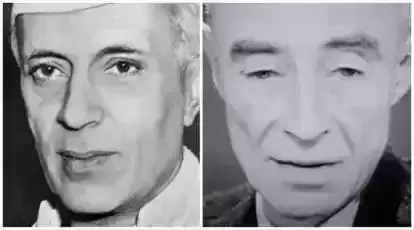
Oppenheimer sent ‘chilling message’ to Jawaharlal Nehru about US building weapon deadlier than atom bomb
text_fieldsWith his latest film, Oppenheimer, director Christopher Nolan has once again brought attention to one of history's most divisive figures—and, in Nolan's own words, "the most important person who ever lived." The Manhattan Project, an American initiative that produced the first atomic weapons, was overseen by Oppenheimer in the 1940s.
After dropping two bombs on the Japanese cities of Hiroshima and Nagasaki, Oppenheimer frequently discussed the shame he felt and devoted the remainder of his life to promoting nuclear power regulation. He advised his administration to use extreme caution and declined to take part in the development of the hydrogen bomb. In Nolan's film, these topics are extensively explored, and the movie finishes with a vision of the end of the world that a guilty Oppenheimer has, Indian Express reported.
Additionally, according to author Nayantara Sahgal, Oppenheimer tried to contact then-prime minister Jawaharlal Nehru about the US government's plans to develop a weapon "far more deadly than the atomic bomb" and pleaded with him not to exchange crucial thorium for the wheat that India was in need of at the time with the Americans. Sahgal, who is Nehru's niece, reprinted a letter she got from her mother and Vijaya Lakshmi Pandit, who was working as India's envoy in Moscow, Washington, and London at the time, in her book Nehru: Civilising A Savage World.
In the letter, she told him about a conversation she had with Oppenheimer, who’d run her up from Princeton, and told her that he had ‘something very urgent to communicate’ and was sending an emissary, Amiya Chakravarti, who brought the ‘chilling message that the United States was developing a weapon far more deadly than the atom bomb.’ For this purpose, the US needed access to India’s ‘inexhaustible supply’ of thorium and was prepared to offer wheat in exchange. Oppenheimer begged India not to sell any thorium to the US voluntarily or through pressure, but Nehru wouldn’t have done it either way, as he ‘abhorred nuclear weapons and strove passionately to seek their total elimination’, as Sahgal wrote.
According to Oppenheimer's co-biographer Kai Bird, the theoretical physicist was given the opportunity to become a citizen of India by Nehru in 1954, but he probably didn't take it seriously because he was a staunch patriot. Oppenheimer, which features Cillian Murphy as the lead character, carefully examines the witch hunt that his own government conducted against him after he refused to submit to its demands. In India, where it has earned over Rs 50 crore, the movie has been quite successful.























